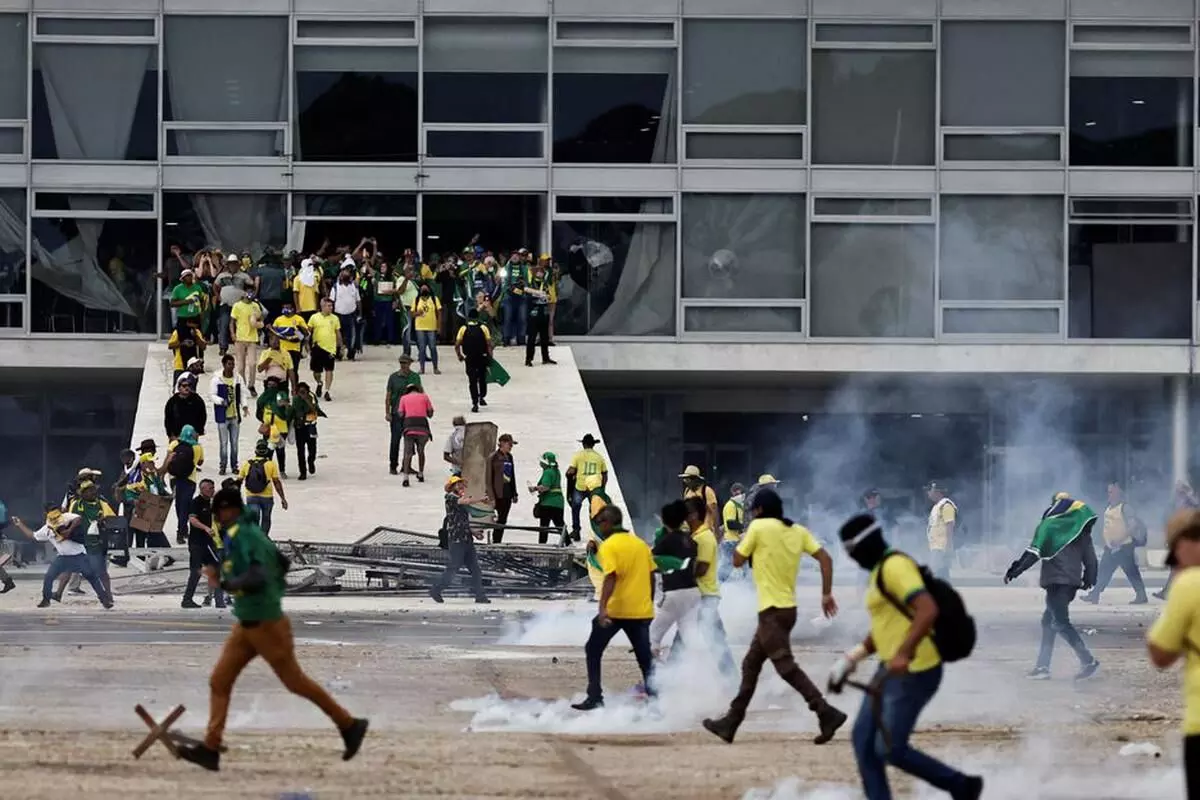A malicious plot

Luiz Inácio Lula da Silva’s week-old government in Brazil sustained an overthrowing attempt by the supporters of ex-President Jair Bolsonaro, who are refusing to accept the election results announced in late October last year. The results declared Leftist Lula as the victor with a narrow margin — he managed to get 50.9 per cent of the votes compared to 49.1 per cent by far-Right incumbent Bolsonaro. The announcement of the results had almost split the nation into two halves on ideological lines. Neither Bolsonaro nor his supporters were willing to acknowledge the defeat. Their hopes lay in the military intervention that would, according to them, bring “good elections.” Supporters have even been camping outside military bases to elicit military intervention. The dissatisfaction among Bolsonaro’s supporters finally culminated in a dreadful incident on Sunday as they stormed the Three Powers Plaza which houses the supreme court, the presidential palace and congress (all the three wings of the government). Parallels are being drawn with the US Capitol Hill violence that erupted after Donald Trump and his right-wing supporters refused to accept the electoral mandate in the United States. It may be noted that unlike in the case of US Capitol Hill violence, the present unrest by Bolsonaro’s supporters may not be completely spontaneous. The storming in Brazil took place after a lapse of more than two months since the results were announced. The shameful incident took place a week after Lula was sworn in as the new President, and also after Bolsonaro left the country for the United States. It appears that more cold blood is involved in Brazilian unrest. These are bad precedents for democracies around the world. The essence of a democracy lies in the acceptance of people’s mandate. Refusal of any leader, or their supporters, to accept people’s mandate will lead to a weakening of the democratic sentiment. Such actions should have no place in the democratic world order. Thankfully, the Brazilian government has arrested the protest and annulled undemocratic intentions. President Lula is right in his affirmation to avowedly punish “vandals, neo-fascists and fanatics.” He has also pointed out the “incompetence, bad faith or malice” of the law enforcement bodies. This should not be read as a mere customary remark. The truth is that Bolsonaro’s supporters stormed the topmost democratic institutions of the country amid conspicuous silence of the military. Supreme court justice Alexandre de Moraes observed that the attacks “could only have happened with the acquiescence, or even direct involvement, of public security and intelligence authorities.” Justice Moraes also ordered the removal of pro-Bolsonaro governor Ibaneis Rocha from his post for 90 days. The storming of the congress, it seems, has stirred up the conscience of the Brazilian masses as well. Tens of thousands of pro-democracy supporters have come to the streets to rally against the violent act perpetrated by Bolsonaro’s supporters. Furthermore, international leaders including Narendra Modi, Joe Biden and Rishi Sunak, among others, have condemned the attack. Ironically, Brazil’s ex-President Jair Bolsonaro himself contended that the “line was crossed” by attacking democratic institutions — though he fell short of condemning protestors and rather blamed Lula for the situation. At the present moment, it appears that contrary to what Bolsonaro and his supporters would have wanted, the attack has consolidated more support for the 77-year-old prisoner-turned-President Lula da Silva. The bet played by Bolsonaro’s supporters has evidently backfired. Not just the legitimacy of Lula’s government has become a topic of discussion globally, but the mobilisation of his supporters, domestically, is also underway. On the other hand, Bolsonaro’s supporters are reported to be pushed back from their camps outside military bases while Bolsonaro himself remains hospitalised in Florida for abdominal pain. Lula da Silva should undoubtedly use a firm hand to deal with the volatile situation in the country. The incident in Brazil is also a lesson for the world at large to be prepared to stave off such undemocratic acts as and when they unfold. The world should come together to oppose the path taken by Bolsonaro’s supporters. If the incident in Brazil was a repeat of US Capitol Hill violence, the link needs to be broken to avoid further additions to the list.



